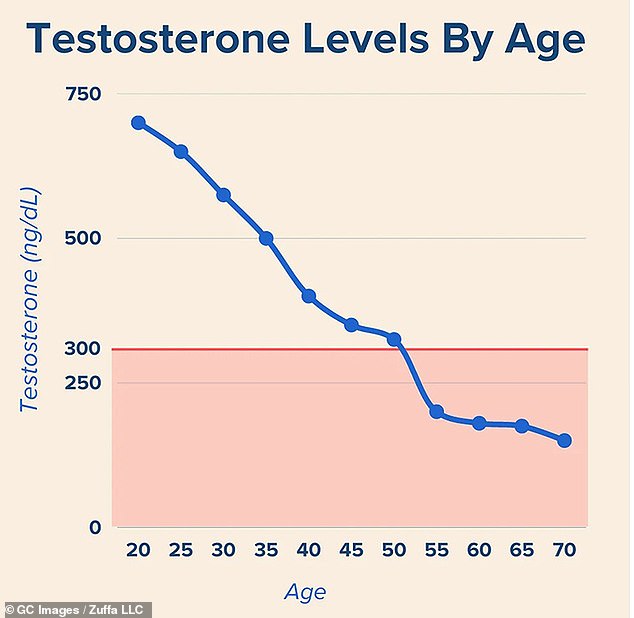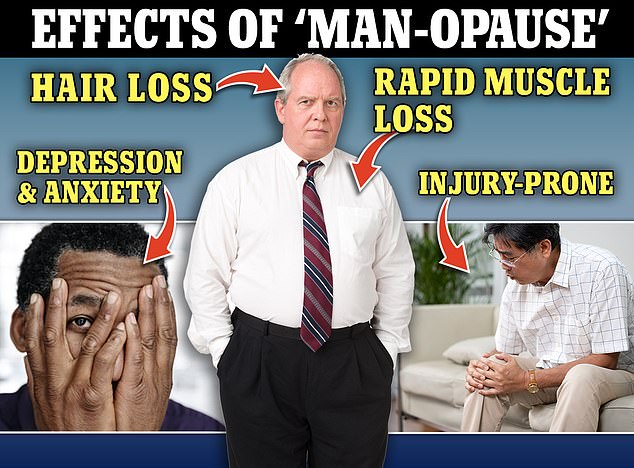Male NHS employees suffering from the “manopause” are being offered special uniforms, tailored desk spaces and up to a year of paid leave to help them cope with the “hormonal change”, MailOnline can reveal.
The controversial term describes the supposed drop in sex hormones that affects middle-aged men, although experts say a significant drop is only true for an extremely small number of people with medical disorders.
When used as a comparison to female menopause, the term is “useless and misleading”, according to the NHS website.
Experts say that while menopause is caused by a sudden change in hormones that triggers the dreaded symptoms, the decline in testosterone occurs gradually and much less significantly over many years.
This means that symptoms are much less likely to appear.
However, earlier this week, data from Freedom of Information requests obtained by the BBC revealed that one in 10 NHS trusts have protocols in place to manage “manopause”, also called andropause.
Now, MailOnline can reveal intriguing details of some of these initiatives.
For example, NHS East Midlands Ambulance Service has produced a document for managers entitled: ‘Andropause in the Workplace Guidance Document’.
NHS employees experiencing ‘manopause’ are being offered special uniforms, personalized desk spaces and equal access to menopause support. stock image
The guidance advises “all staff” to be aware of manopause and encourages men to “request reasonable adjustments in the workplace” if they suffer from it.
The document also states that men are entitled to a special uniform made of “natural fibers” that could help with “hot flashes and sweating.”
Another setting available is to change the position of a man’s desk.
“Location near a window or door may help,” the document reads. Managers should also “ensure portable fans or heaters are available” to “allow the individual to personally control the temperature around them.”
Other support listed includes flexible working and time off to attend medical appointments for manopause, and the offer to discuss the condition with a manager.
The document adds: “Man should not be placed in a position of shame where he is expected to suffer in silence, but being offered support to identify the problem is real.”
Trust staff are also offered up to a year’s paid leave if they are affected by the menopause, similar to the Trust’s policy for other health conditions, according to previous reports.
NHS East Midlands Ambulance Service is not the only one offering andropause support to male employees.
University Hospitals Birmingham NHS Foundation Trust offers middle-aged male staff the same “extra” support as it offers women experiencing the menopause, according to its website.

Testosterone levels peak in young adulthood, around age 20, but decline about 1 percent annually after age 30.

As with women, ‘male menopause’ is used to describe the period in an adult man’s life when his hormone levels fall, causing a range of symptoms that can be life-changing and debilitating, from erectile dysfunction even depression, anxiety and rapid weight gain. gain
Several other NHS trusts also include brief mentions of “andropause” in documents outlining their menopause policy, although they do not specify details of the support offered.
Doctors insist that it is incorrect to equate manopause and menopause.
Studies suggest that about one in 50 men see significant reductions in sex hormones as they age.
But this is true for all women.
It is also different in terms of time scale and impact. Menopause occurs over the course of only two to five years.
In contrast, men experience a gradual decline in testosterone after age 30 or so, which equates to about a 1 percent drop per year. As a result, not all men will suffer symptoms.
The NHS warns that menopause symptoms can have a “major impact” on women’s lives, including relationships, social life, family life and work.
But the health service is less generous when it comes to describing andropause.
The NHS website says: “This label is misleading because it suggests that the symptoms are the result of a sudden drop in testosterone in middle age, similar to what occurs in female menopause.” This is not true.’
Like hormone replacement therapy (HRT) for women, some men who struggle with falling testosterone may be offered artificial boosters to help combat symptoms.
This usually occurs in men whose falling levels are related to a specific medical condition known as late-onset hypogonadism, which means their testicles produce too little of the hormone.

